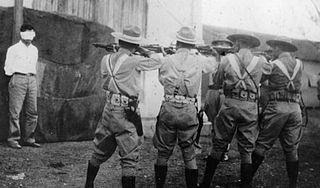Related Research Articles
Capital punishment, also known as the death penalty, is a state-sanctioned practice of killing a person as a punishment for a crime. The sentence ordering that an offender is to be punished in such a manner is known as a death sentence, and the act of carrying out the sentence is known as an execution. A prisoner who has been sentenced to death and awaits execution is condemned and is commonly referred to as being "on death row".

Capital punishment, also known as the death penalty, is a state-sanctioned practice of killing a person as a punishment for a crime. Historically, capital punishment has been used in almost every part of the world. Currently, the large majority of countries have either abolished or discontinued the practice.
Capital punishment in the United Kingdom predates the formation of the UK, having been used within the British Isles from ancient times until the second half of the 20th century. The last executions in the United Kingdom were by hanging, and took place in 1964; capital punishment for murder was suspended in 1965 and finally abolished in 1969. Although unused, the death penalty remained a legally defined punishment for certain offences such as treason until it was completely abolished in 1998; the last execution for treason took place in 1946. In 2004 the 13th Protocol to the European Convention on Human Rights became binding on the United Kingdom; it prohibits the restoration of the death penalty as long as the UK is a party to the convention.

In the United States, capital punishment is a legal penalty throughout the country at the federal level, in 27 states, and in American Samoa. It is also a legal penalty for some military offenses. Capital punishment has been abolished in 23 states and in the federal capital, Washington, D.C. Capital punishment is, in practice, only applied for aggravated murder. Although it is a legal penalty in 27 states, only 20 states have the ability to execute death sentences, with the other seven, as well as the federal government, being subject to different types of moratoriums. The existence of capital punishment in the United States can be traced to early colonial Virginia. Along with Japan, South Korea, Taiwan, and Singapore, the United States is one of five advanced democracies and the only Western nation that applies the death penalty regularly. It is one of 54 countries worldwide applying it, and was the first to develop lethal injection as a method of execution, which has since been adopted by five other countries. The Philippines has since abolished executions, and Guatemala has done so for civil offenses, leaving the United States as one of four countries to still use this method. It is common practice for the condemned to be administered sedatives prior to execution, regardless of the method used.

In the U.S. state of California, capital punishment is a legal penalty. However it is not allowed to be carried out as of March 2019, because executions were halted by an official moratorium ordered by Governor Gavin Newsom. Prior to the moratorium, executions were frozen by a federal court order since 2006, and the litigation resulting in the court order has been on hold since the promulgation of the moratorium. Thus, there will be a court-ordered moratorium on executions after the termination of Newsom's moratorium if capital punishment remains a legal penalty in California by then.

The list of people executed by the U.S. state of Texas, with the exception of 1819–1849, is divided into periods of 10 years.

Capital punishment in China is a legal penalty. It is commonly applied for murder and drug trafficking, although it is also a legal penalty for various other offenses. Executions are carried out by lethal injection or by shooting. In a survey conducted by the New York Times in 2014, it was found the death penalty retained widespread support in Chinese society.

Capital punishment in New Zealand – the process of sentencing convicted offenders to death for the most serious crimes and carrying out that sentence, as ordered by a legal system – first appeared in a codified form when New Zealand became a British colony in 1840. It was first carried out with a public hanging in Victoria St, Auckland in 1842, while the last execution occurred in 1957 at Mount Eden Prison, also in Auckland. In total, 85 people have been executed in New Zealand.
Capital punishment in Sweden was last used in 1910, though it remained a legal sentence for at least some crimes until 1973. It is now outlawed by the Swedish Constitution, which states that capital punishment, corporal punishment, and torture are strictly prohibited. At the time of the abolition of the death penalty in Sweden, the legal method of execution was beheading.
Capital punishment is forbidden by the Charter of Fundamental Rights and Freedoms of the Czech Republic and is simultaneously prohibited by international legal obligations arising from the Czech Republic's membership in both the Council of Europe and the European Union.
Capital punishment in the Philippines specifically, the death penalty, as a form of state-sponsored repression, was introduced and widely practiced by the Spanish government in the Philippines. A substantial number of Filipino national martyrs like Mariano Gómez, José Burgos, and Jacinto Zamora, Thirteen Martyrs of Cavite, Thirteen Martyrs of Bagumbayan, Fifteen Martyrs of Bicol, Nineteen Martyrs of Aklan and Jose Rizal were executed by the Spanish government.

Execution by shooting is a method of capital punishment in which a person is shot to death by one or more firearms. It is the most common method of execution worldwide, used in about 70 countries, with execution by firing squad being one particular form.
Capital punishment is forbidden in Switzerland by article 10, paragraph 1 of the Swiss Federal Constitution. Capital punishment was abolished from federal criminal law in 1942, but remained available in military criminal law until 1992. The last actual executions in Switzerland took place during World War II.
Capital punishment in the state of Vermont ended in 1972 for all crimes due to Furman v. Georgia and has not been reinstated since. Vermont still has pre-Furman capital statutes on the books but these have been left unenforceable due to Furman. Most states changed their capital punishment laws to conform with Furman and Gregg v. Georgia, but the Vermont legislature has yet to do so, effectively abolishing the death penalty in the state. The state last executed a prisoner, Donald DeMag, in 1954, after he received the sentence for a double robbery-murder he committed after escaping prison.
Capital punishment is a legal penalty in the U.S. state of South Dakota.

Donald DeMag was the last person executed by the U.S. state of Vermont.
Capital punishment is a legal penalty in South Korea. As of December 2012, there were at least 60 people in South Korea on death row. The method of execution is hanging.
Capital punishment is abolished in the District of Columbia. However, a number of executions were carried out under the District's jurisdiction before abolition. These executions should be distinguished from cases such as the 1942 execution of the six Nazi saboteurs which took place in the District, but under the jurisdiction of the Federal Government.
Capital punishment in Thailand is a legal penalty, and the country is, as of 2021, one of 54 nations to retain capital punishment both in legislation and in practice. Of the 10 ASEAN nations, only Cambodia and the Philippines have outlawed it, though Laos and Brunei have not conducted executions for decades.
References
- ↑ "Abolition of capital punishment in Vermont". statelaws.findlaw.com. Retrieved 18 August 2019.
- 1 2 "Executions in Vermont, from 1778-1954". deathpenaltyusa.org. Retrieved 18 August 2019.